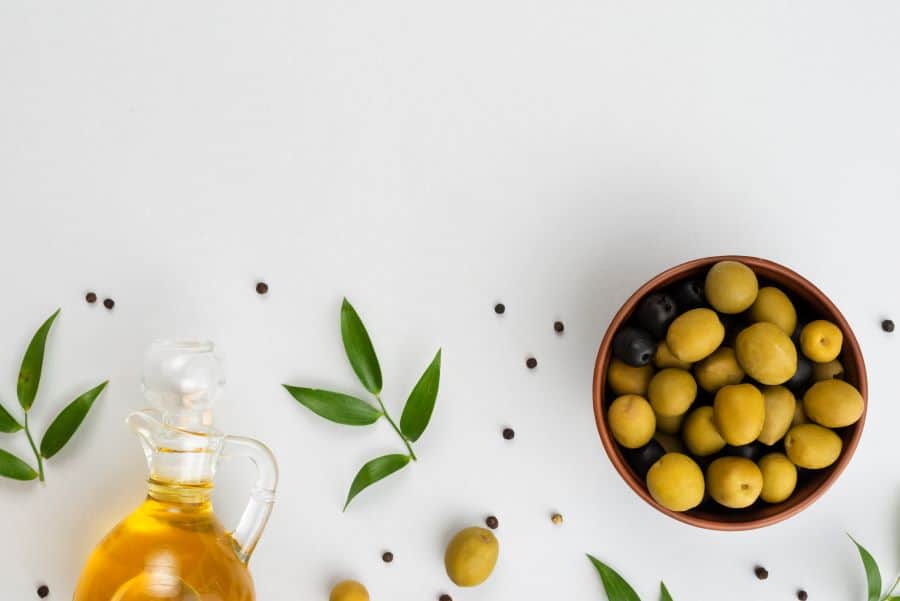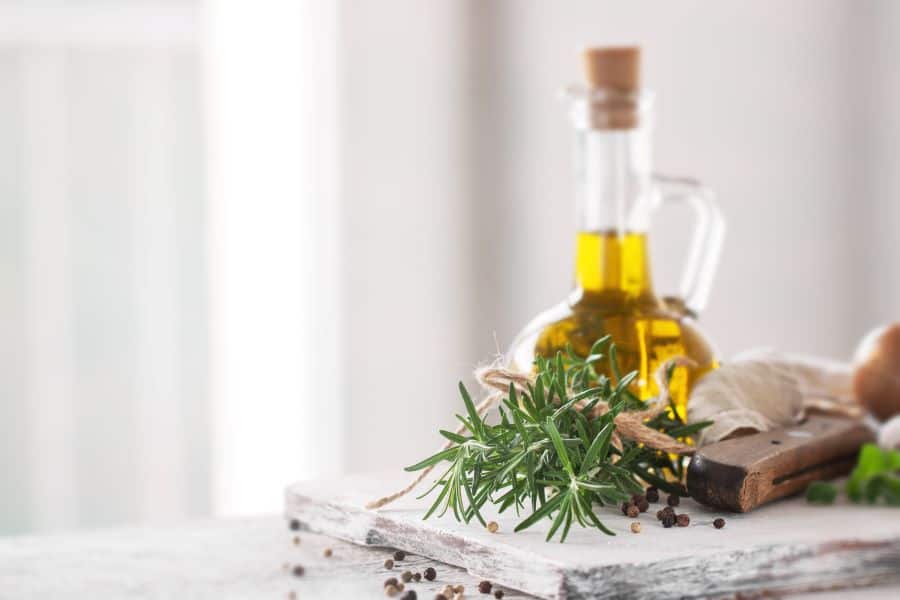Olive oil is one of the most versatile ingredients in the kitchen. It’s delicious on salads and for dipping bread. It’s also popular for sauteing vegetables or making a roux for soups and stews.
If you choose genuine extra virgin olive oil (EVOO), the oil is also tasty and appealing to the palate. Higher quality EVOO offers the best flavor profile.
But is olive oil high in histamine? The short answer is no.
Pure extra virgin olive oil should not contain histamine.
Olive oil is a low histamine oil but there are some caveats that we’ll discuss to help you make the smartest choice when choosing a low-histamine olive oil.
Extra Virgin Olive Oil is Low Histamine
If you have histamine intolerance, extra virgin olive oil is your best choice. Extra virgin olive doesn’t undergo processing and exposure to heat. It’s simply spun in a centrifuge to separate out the oil and filtered to remove impurities.
On the other hand, olive oil exposed to heat and processing to make regular olive oil (not EVOO) can increase the product’s histamine content. That’s why it’s best to choose the extra virgin variety.
The Histamine Content of Olive Oil
Of all the oils used for cooking, olive oil is one of the healthiest, due to the heart-healthy monounsaturated fats it contains. (10)
Plus, EVOO is rich in polyphenols, compounds with anti-inflammatory benefits. (8) Eating an anti-inflammatory diet is helpful if you have histamine intolerance, allergies, and for your overall health. The Histamine Content of Olive Oil
Most people with histamine intolerance can tolerate olive oil without developing histamine intolerance symptoms.
Though extra virgin olive oil is the best choice, as it’s least processed, most people with histamine intolerance tolerate extra virgin and regular olive oil.
But keep in mind, every one with histamine intolerance is a little different. Your level of diamine oxidase (the main enzyme that breaks down histamine) may be higher or lower than someone else with histamine intolerance.
If you have a very low diamine oxidase level, foods that someone else can get by with might cause a problem for you.
With histamine intolerance, it also matters what your overall histamine load is.
The other foods you eat, and even certain medications, make it harder to break down histamine, so you have to look at your diet as a whole, rather than a single food in isolation.

Keep a Food Journal
The variability in tolerance to specific foods shows how important it is to determine how foods such as olive oil affect you.
The best way to do that is to keep a food journal and update it daily. Don’t stop after a few weeks and assume you know how each food affects you.
One of the most important things to do to avoid excess histamine is pay attention to what you eat. Tracking your meals and foods in a food journal helps identify which foods cause a reaction and how severe that reaction is. You can use this information to fine-tune your diet.
When you have histamine sensitivity symptoms, look at your food journal and see what you ate differently.
Be sure to write down everything that goes into your mouth, including meals, snacks, beverages, supplements, medications, and herbs.
Correlate Diet with Histamine Intolerance Symptoms
If other factors may have caused symptoms other than foods (such as seasonal allergies), add that to your journal too.
Once you have a better idea of what you’re consuming each day, look at each item and decide if it’s something that could factor into your histamine intolerance symptoms. If it is, make a note of it and avoid it in the future.
Remember, you eat food in the context of other foods. If you eat foods very low in histamine on a given day, a higher histamine food might have little impact because your total histamine burden didn’t rise that much.
Plus, it may take a day or more for histamine intolerance symptoms to show up after you’ve eaten something that overwhelms your diamine oxidase.
Is Olive Oil Beneficial for Histamine Intolerance?
Of all the oils used for cooking, olive oil is one of the healthiest, due to the heart-healthy monounsaturated fats it contains. (10)
Plus, olive oil contains polyphenols, compounds with antioxidant and anti-inflammatory benefits. If you have histamine intolerance, your body is in a state of low-grade inflammation.
Eating an anti-inflammatory diet may be synergistic with a low-histamine diet in terms of reducing histamine intolerance symptoms.
Olive oil also contains vitamin E, an antioxidant vitamin. Getting enough dietary vitamin E is important if you have any type of inflammatory condition.
Research shows vitamin E blocks the release of histamine from mast cells. (6) Vitamin E may help ease allergic reactions, including atopic dermatitis, a skin condition. (7)

What about the Fats in Olive Oil?
Another benefit of olive oil over many other oils, whether you have histamine intolerance, is its high content of monounsaturated fats. Monounsaturated fats make up over 70% of the fat in olive oil. Only 14% is saturated fat and 11% polyunsaturated. (1)
Why are monounsaturated fats a wise choice? According to the American Heart Association, substituting monounsaturated fats for trans-fat and saturated fat is beneficial for heart health. (2)
Though monounsaturated fats are healthier than trans-fat and saturated fat, moderation is key. Keep the total fat content of your diet within the recommended range, between 25 and 30%. (3)
Research also shows that replacing refined carbohydrates with monounsaturated fats improves risk markers that indicate a higher risk of cardiovascular disease and type 2 diabetes. (5)

Is Olive Oil Beneficial for Histamine Intolerance?
Choose Your Olive Oil Carefully
Olive oil and extra-virgin olive oil are not the same. Extra virgin olive oil is made from the first pressing of olives, making it less acidic and bitter than olive oil.
Because heat isn’t used in processing this oil, its flavor remains robust. Plus, the lack of heat processing lowers the odds of histamine being in that bottle of olive oil.
The lack of heat means extra virgin olive oil retains more antioxidants relative to standard olive oil.
A downside is extra-virgin olive oil has a lower smoke point, so you shouldn’t use it for high-temperature applications, such as deep frying. Always store extra virgin olive oil in a cool, dark place, but not a refrigerator.
Ideally, choose a brand of olive oil that comes in a dark glass bottle, as light can degrade the quality of the oil over time.
Beware of Olive Oil Fraud
Also, be aware that olive oil fraud is common. Bottlers of olive oil mix olive oil with cheaper oils, such as corn oil or soybean oil, to save money.
Italy is supposed to be a leader in olive oil production, but olive oil fraud is rampant there too. In the late 1990s, olive oil was the most adulterated food product the European Union produced. (9)
Look for a brand of extra virgin olive oil certified to be authentic. The North American Olive Oil Association has a testing and certification program and gives its seal to brands that pass their stringent testing.
It may cost a little more, but worth it. If there’s fraud, you won’t know what oil was added. For example, some manufacturers add hazelnut oil, which would be a problem if you have a nut allergy.
Do you dip bread into olive oil? Find out whether white bread is low histamine.

Olive Oil and Histamine: Why It’s a Good Choice
Olive oil is not high histamine, and it has some potential health benefits relative to other processed cooking oils, saturated fats, and trans-fat. The added perk is the antioxidants and anti-inflammatory compounds in extra-virgin olive oil.
If you have histamine intolerance, taming low-grade inflammation as much as possible is important for your health. You can do that by eating a low-histamine diet, but also by consuming low-histamine foods rich in anti-inflammatory compounds.
Olive oil contains polyphenols, compounds with powerful anti-inflammatory activity. These components may be beneficial for helping your body fight the inflammation that goes along with histamine intolerance.
But you can also get those benefits from eating non-starchy vegetables, fruit, and other low-histamine plant-based foods. If you have histamine intolerance, you can enjoy olive oil in moderation but opt for extra-virgin olive oil when you can
From a health standpoint, olive oil is also a better choice than processed seed oils you find in the cooking oil section at the supermarket, like soybean oil and corn oil.
To get the highest quantity of antioxidant polyphenols, choose extra-virgin olive oil from a reputable supplier and store it in a dark cool place. Replace the bottle after 6 months to ensure maximum freshness.
Key Takeaways
- Being minimally processed, EVOO is the best choice, as it is unprocessed.
- EVOO contains compounds with anti-inflammatory activity. These components may be beneficial if you have histamine intolerance.
- Most people tolerate olive oil well, but you should determine your own tolerance.
- Keep a food journal and monitor how your body responds to olive oil.
- Olive oil is high in monounsaturated fats. These heart-healthy fats are a smart substitute for saturated fat
- Be cautious of olive oil fraud, where cheaper oils (that aren’t histamine free) are mixed with olive oil. Look for certified authentic brands to ensure quality and purity.
- While olive oil is a better choice than processed seed oils, moderation is key. Build your diet around a variety of low-histamine foods.
- Store olive oil properly to keep it fresh and preserve its antioxidants.
References:
- “11 Proven Benefits of Olive Oil – Healthline.” 14 Sept. 2018, https://www.healthline.com/nutrition/11-proven-benefits-of-olive-oil.
- “Monounsaturated Fat | American Heart Association.” https://www.heart.org/en/healthy-living/healthy-eating/eat-smart/fats/monounsaturated-fats.
- “Facts about monounsaturated fats: MedlinePlus Medical ….” 01 Sept. 2021, https://medlineplus.gov/ency/patientinstructions/000785.htm.
- “Monounsaturated Fatty Acids and Risk of Cardiovascular ….” 14 Sept. 1999, https://www.ahajournals.org/doi/full/10.1161/01.CIR.100.11.1253.
- “Metabolic Effects of Monounsaturated Fatty Acid–Enriched ….” https://care.diabetesjournals.org/content/39/8/1448.
- Tettamanti L, Caraffa Al, Mastrangelo F, Ronconi G, Kritas S, Frydas I, Conti P. Different signals induce mast cell inflammatory activity: inhibitory effect of Vitamin E. J Biol Regul Homeost Agents. 2018 Jan-Feb;32(1):13-19. PMID: 29504360.
- Jaffary F, Faghihi G, Mokhtarian A, Hosseini SM. Effects of oral vitamin E on treatment of atopic dermatitis: A randomized controlled trial. J Res Med Sci. 2015 Nov;20(11):1053-7. doi: 10.4103/1735-1995.172815. PMID: 26941808; PMCID: PMC4755091. https://pubmed.ncbi.nlm.nih.gov/26941808/
- Bayram B, Esatbeyoglu T, Schulze N, Ozcelik B, Frank J, Rimbach G. Comprehensive analysis of polyphenols in 55 extra virgin olive oils by HPLC-ECD and their correlation with antioxidant activities. Plant Foods Hum Nutr. 2012 Dec;67(4):326-36. doi: 10.1007/s11130-012-0315-z. PMID: 23070730.
- “Olive Oil Fraud – Dr. Andrew Weil.” https://www.drweil.com/diet-nutrition/nutrition/olive-oil-fraud/.
- Schwingshackl L, Hoffmann G. Monounsaturated fatty acids, olive oil and health status: a systematic review and meta-analysis of cohort studies. Lipids Health Dis. 2014 Oct 1;13:154. doi: 10.1186/1476-511X-13-154. PMID: 25274026; PMCID: PMC4198773.


